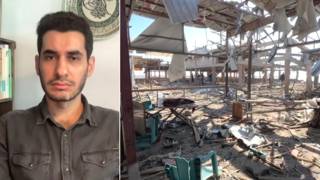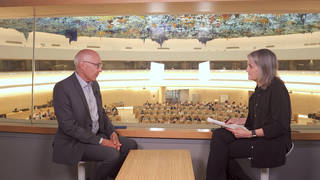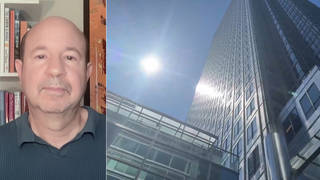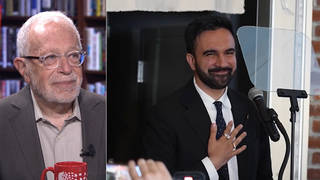
Guests
- Pamela Whiteeditor of the Colorado Daily, which is published in Boulder, Colorado.
- Brian Hansenreporter for the Colorado Daily.
A reporter covering an environmental protest in Vail, Colorado, was arrested yesterday after he refused to leave the area where police were arresting demonstrators. Environmental activists were demonstrating against Vail’s Category III expansion, which would lead to logging that could lead to the extinction of the lynx, a cat species of Colorado. The protesters had been there since Thursday.
Brian Hansen, a reporter with the Colorado Daily, was arrested soon after Forest Service agents and the County Sheriff’s Office raided the protest yesterday, which had been going on since last Thursday. He was released late last night after being charged with a federal misdemeanor. He joins us now from Boulder, Colorado.
Transcript
AMY GOODMAN: You are listening to Pacific Radio’s Democracy Now! I’m Amy Goodman.
A reporter covering an environmental protest in Vail, Colorado, was arrested yesterday as he refused to leave the area where police were arresting demonstrators. Environmental activists are demonstrating against Vail’s Category III expansion, which would lead to logging that could lead to the extinction of the lynx, a cat species of Colorado. The protesters had been at the area since Thursday. Brian Hansen, a reporter with the Colorado Daily, joins us now from Boulder, Colorado, as well as his editor, Pamela White.
And we welcome you both to Democracy Now!
PAMELA WHITE: Thank you.
BRIAN HANSEN: Thank you.
AMY GOODMAN: Brian, can you tell us what happened? Tell us first what the protest is about, and then let’s find out what happened to you.
BRIAN HANSEN: Well, the protesters have been opposing this Category III expansion for many years now, and they have lost pretty much on all fronts. This was kind of a last-ditch effort. They tried some civil disobedience tactics to block this protest. And, well, we’ve seen what happened.
AMY GOODMAN: Can you explain the significance of the protest? We’ve been covering what’s happening at Vail. You’ve got the Vail Resorts Incorporated. That’s a half a billion-dollar corporation that owns not only Vail Mountain but four other areas, mountain resort areas, in Colorado. And the history of this protest?
BRIAN HANSEN: Mm-hmm. Well, the significance of it is that — and you have to understand that not everyone who is opposed to the Category III expansion is really — would like to enact civil disobedience. Some people really tend to stick to the legal challenges. Some people are up there protesting. But there sure were a lot of people. The emotions were running very high. Like I said, several people called it a last-ditch effort to stop this. They really feel that they’re — the process has been corrupted here.
AMY GOODMAN: So, tell us what happened to you.
BRIAN HANSEN: Well, I was up there earlier this week. I guess I got there on Wednesday afternoon, because Vail was able to go into Category III on the morning of July 1st, so I stayed up in the area. And, let’s see, I got word that there had been a tripod erected on the main road running up the front side of the mountain; real early in the morning, went over there. Sure enough, there it was. Law enforcement, security forces were all around it. A little bit later on, they brought up a cherry picker, towed it up on a truck, to try and release the activist who was up in the — up in the tripod, and the activists intercepted the truck about a quarter-mile down the road from the tripod, linked arms in front of the truck. Truck stops. They ducked underneath it. They locked themselves — one guy locked himself to the drive shaft of the running truck with a U-lock around his neck. Fire department arrived on the scene. They proceeded to cut him off. He was screaming. He was getting sparks thrown in his face, things like that.
The significance of this is that the press was able to see this. We were no more than 10 feet away at the time. I believe there was one camera recording this. I was certainly there. There were a number of other print journalists there. We were recording all of this, you know, as members of the press. This certainly did not happen the other day. On Wednesday — excuse me. Let me get my thoughts straight here.
AMY GOODMAN: OK. We’re talking to Brian Hansen, who has spent quite a while in jail, just got out late last night, so it might take a little time to put it all together. As you’re getting your thoughts together, Pamela White, as editor of the Colorado Daily, which is an independent in Colorado, can you tell us about your role as editor in a situation where you had your reporter on the scene, police telling him to get away? You were on the phone with him, cellular phone, as this was all happening?
PAMELA WHITE: Yes, he called at about 5:15. We had been anticipating that they were going to stage an early-morning raid, and so it was vital for him to stay up there overnight so that he could capture this. And he called at about 5:08, I believe, and said, “It’s happening. They’re raiding.” And he said, “They’re telling me I have to leave.” And we really struggled with that. And I was saying, “Well, ask them where’s a safe place that you can stand to observe this? They can’t just force you out of the area.” And he said, “Well, they have a closure order. They’re telling me I have to leave.” And chaos is going on behind him on the phone, people shouting, just so much noise I could barely hear him. And I told him, I said, “Well, try to ask them where you can stay.” And he tried to ask somebody who was standing there, an officer, but the officer was just shouting, “You’re in violation of the federal closure! You have to leave the area!” And I mean shouting quite loudly. And he said, “Pam, he won’t even talk to me.” And I said, “All right, Brian, well, it sounds like you have to go,” and I hung up. And it was almost immediately thereafter that Brian was arrested.
And my feeling about this, of course, is that it’s an outrage, that it’s our job to watch what our federal agencies do. They are our employees, employees of the public, and we need to monitor how they behave. And as his editor, I couldn’t say, “Brian, stand there and get arrested,” but I certainly support what he did. And we’re going to fight this all the way, this misdemeanor charge that he’s facing, because we feel that it is wrong. We found out later that there was a safe place where he could have stood outside the closure area and monitored their activities, and nobody told him that.
AMY GOODMAN: Pamela, there was another reporter who was there who was forced down the mountain?
PAMELA WHITE: Yes, there was a reporter there. I believe he’s from The Daily Trail. And he was trying to get over to where Brian was to find out where indeed the press could go. And he told me yesterday that an agent bellied up to him, literally, stomach to stomach, and pushed him down the mountain with his abdomen. And he, therefore, was not able to get over to where Brian was and find out what had happened, though he later saw that Brian had been arrested.
AMY GOODMAN: Brian, as we wrap up, your final thoughts, after your time in jail and trying to be a reporter on the scene?
BRIAN HANSEN: Well, I would agree that as a member of the press, I really felt like it was imperative that I be there. I saw between 40 and 50 fully decked-out-in-camouflage law enforcement officers rushing down the hill. There was chaos. There was a lot of fear and apprehension that they were going to torture these people. I asked Chuck Dunfrey, the guy in charge of the Forest Service law enforcement, three times where I needed to go. He said, “Brian, get down the mountain. You’ll be informed by public information officers.” I knew that wasn’t going to happen. So I stood my ground and went to jail.
AMY GOODMAN: And finally, Pamela White, to put this in the national context, what we were referring to before, the whole issue of the growing corporate control of the high country communities in Colorado and this half a billion-dollar Vail Resorts company. Can you talk about the issue you’ve been covering for quite a while now, starting in October with the fires that were set at Vail Resorts, and what has happened since, and how it’s changed the environmental community?
PAMELA WHITE: Well, certainly, I think that the pressure and the scrutiny that’s been put on the environmental community by the FBI as a result of the arson up at Vail —
AMY GOODMAN: Who set the fires?
PAMELA WHITE: We don’t know. There is no evidence so far that leads to any one suspect. There were, of course, some activists camped up at Vail when it happened, but they are all very committed to nonviolence, and none of them has been named as a suspect at this point, although they have been, I would say, harassed by the FBI on a very personal level as the FBI has tried to gather information about this. It’s put a lot of pressure on these activists, who are trying very hard to maintain nonviolent opposition to the Category III expansion.
I think it’s really clear, when you see what happened yesterday, and what happened later yesterday afternoon in the courtroom with Brian, that our federal agencies, that are supposed to be serving the public and watching out for our interests, are actually now serving these corporations. When Brian was arraigned, we were told at the Daily that he was not going to be arraigned. Our attorney informed the court that he had retained counsel and that they should notify him if anything would happen. We were told to go home, that we couldn’t do anything. Well, they did hold an arraignment last night. And somehow or another, Vail was informed, and Vail had an attorney at the hearing, but Brian did not, despite our efforts to let them know that we had counsel for him. So, I think that’s a perfect example of how the federal government has been corrupted into serving corporations instead of the people.
AMY GOODMAN: Well, I want to thank you both very much for being with us. We’ll continue to follow this, as you certainly do at the Colorado Daily. Pamela White, if people want to read the Colorado Daily, where can they go online?
PAMELA WHITE: Our web address is www.CODaily.com.
AMY GOODMAN: That’s www.CODaily.com. And I look forward to coming out to Boulder on Labor Day weekend to see everyone.
PAMELA WHITE: We look forward to meeting you.
AMY GOODMAN: Well, it’s good to talk to you, Pamela White, editor of the Colorado Daily, and Brian Hansen, reporter for the Colorado Daily, fresh out of jail. That’s right, posting bail in Vail. Thanks for being with us.
PAMELA WHITE: Thank you.













Media Options